So you already picked up the rubbish and turn the tap off? We
think you're ready for a bigger challenge!
Jump start your own project today. Planning is easy. If you can
dream it, you can do it.
Whether it's to help your family, school or community cut peak
energy, save money, reduce pollution or be prepared in an emergency
- you have all the power you need to make a change!
Talk to your teacher and your friends - and start brainstorming
how you can make a real difference to our planet today.
REMEMBER: You might find help in your local community - seek out
catchment groups, community organisations and talk to your
neighbours. You might find some great advice and willing helpers
for your project are living just nearby! Green Cross Australia can
help you too!
❑ Brainstorm project ideas with your friends
❑ Decide on a project
❑ Make a project plan - list what you need to do
❑ Book a meeting with your principal to share your ideas and ask
how he or she can help
❑ Turn your plan into actions - start work and try to get more
people involved
❑ Record what you do - take photos and videos and write about your
project in your Green Lane Diary
❑ Share your success stories with your friends, teachers and
family
DON'T FORGET TO TELL US WHAT YOU'RE DOING.
Here are some project ideas to get you inspired...
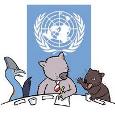
Hold your own UN Meeting
Hold your own United Nations. Can you think of some big problems for your school and community? Get together with your friends or class, head to the library or under a shady tree and have a meeting. Make sure you keep some notes and work out what your group will do. Dream it and do it!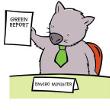
Have your say!
Research a problem and write a letter to your local paper telling them about the issue. Ask them to publish an article on it in their next issue. This will make a difference by starting a conversation in your community - all thanks to you! You could look start a conversation about sea level rise, new forms of clean energy, ways to reduce waste and how to saving energy.
Zap your peak energy use
What's peak energy? We the time we get home in the afternoon until bedtime, we all watch TV, study on the computer, turn lights on, cook dinner, heat water for baths and charge phones. And that's in homes all across Australia. This is peak energy time, between 4-8pm, when our power stations must work overtime to supply all our power hungry needs. Can you find ways to reduce energy use during this very crucial time?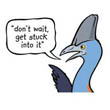
Power up solar style
We have so many devices. How many phone, games, laptop and camera chargers does your family have? Save for a solar charger and use it to power your toys and devices. Did you know you can get solar phone chargers and even backpacks with solar panels built in? Don't believe me? Google it! Save your pocket money, fund raise, do jobs at home, and SAVE UP for a solar charger and never run out of batteries again!
To fly, drive or pedal?
Before you go on your next holiday, consider which mode of travel would be more environmentally friendly. Ask your parents for the itinerary and start researching! Can you use public transport where you're going and not hire a car? Can you offset your carbon on the flights? Is there a hotel close to where you want to go so you can ride or walk to your holiday attractions.
Are you living green?
Every day we make choices about how we live. These little choices have an impact on our environment and others around us. Choose an area of your life (eg home, school, friends group) and brainstorm everyday actions that you could swap to green actions. See week 4 our your diary for inspiration! Write a to-do list, give it to everybody and encourage them to tick off their green choices. Keep reminding them if they forget!!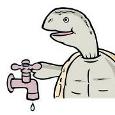
The Drop Challenge
How much water do you use each day? How could you find out? Start monitoring you and your family's water consumption and issue a challenge to them to reduce this amount. Call it the Drop Challenge - every drop counts! You could read the water meter weekly and make a graph to put on the fridge to keep everybody motivated.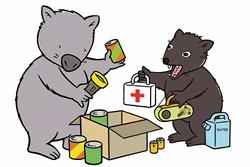
Prepare your family for extreme weather
Make sure your home and family has what it needs, when your need it! Extreme weather can affect us all when we least expect it, so your project investigate the types of weather you could face (eg storm, flood, cyclone, bushfire) and find ways to prepare your family with an emergency plan and supplies for a few days. You'll need a torch, tinned food, bottled water, a battery powered radio and know the local emergency services hotline... What else?
Be a detective
Be a detective and take photos of plants and animals living around you. Then make a brochure informing your community about them and how they can take care of them. Remember to share your photos with us on the "Tell us what you are doing" page.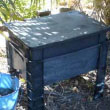
Start up a worm cafe
One of the easiest ways to reduce landfill is to build a compost and worm farm. Food scraps and other plant-based materials such as paper
and cardboard can be used to feed the worms. They will break it down to organic material that can be used as natural fertiliser in the garden. Start a worm cafe at home or at your school.
Become carbon neutral
Have you heard about carbon sinks? They are places that store carbon instead of having it released into the atmosphere. It is a way of balancing (or offsetting) our carbon dioxide emissions to become carbon neutral. Are there any carbon sinks in your local area? What could you do around your school or home to become carbon neutral?
Buy local, reduce your food miles
Some of the things you eat have traveled a long way to end up in your tummy. The orange you ate for morning tea could have flown all the way from the USA. Just like people, food and produce that travels contributes to pollution and greenhouse gases. If you eat locally produced food, you are reducing your food miles! Find out where your food comes from and investigate swapping those items for locally produced goods.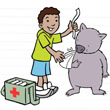
Volunteer to help others
The best things in life really are free like being kind and helpful to others by volunteering your skills. Some people rescue injured animals, others run tuck shops or care for the elderly. Kids can get involved too by helping whenever you can. Find an organisation you are interested in and organise for you and your friends to volunteer there.
Be frog friendly
Find out what species of frogs are native to your local area. Build a pond in your school or backyard to help breed more frogs - watch out for toads!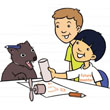
Become an inventor
Are you creative? Do you like technical challenges? Watch out world, here comes another budding inventor! There are heaps of examples of kids thinking outside the square and coming up with something great! Be inspired by nature to design your own invention. Be creative - the sky's the limit! Take a look here for some inspiration.
Act it out!
Like a bit of drama? Be a star of your own documentary about an issue that you are passionate about. You could be the next Steve Irwin or David Attenborough! Possible topics include: telling people about the native plants and animals in your area, preparing your family for extreme weather, or anything that will help kids live cleaner and greener!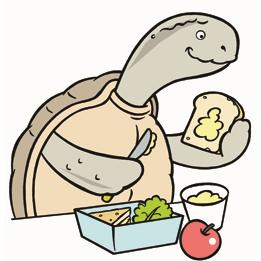
Think about it
Have a look in your pantry and grab a few packets or tins of food. Read the labels to find out where it came from. Also make note of anything that tells you about how 'green' it is. For example, is the packaging made of recycled products? Is it locally produced or has it traveled a long way? Does the company support ethical farming or offset their carbon emissions? Make a list of all the green and not-so-green products. Are there environmentally friendly products that you could swap to?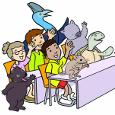
Start a SWAP Club
Getting new stuff is great! But it's a shame to throw it out when we no longer use or need things. Share the fun and reduce waste by swapping books, CDs, clothes and games with your friends. They'll be new to them and you'll get new things in return - bonus!
Express yourself
Create a rap or another type of song, teaching kids how to say 'No' to plastic. Alternatively, get the kids to collect their plastic waste from lunch or morning tea and turn it into recycled works of art.